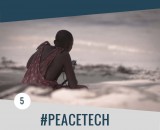Democracy & Governance
Criminalized Power Structures
Two recent volumes by Michael Dziedzic are a welcome addition to our series of books on Peace and Security in the Twenty-First Century, because what he and his colleagues call criminalized power structures are little studied but invariably a key obstacle to the success of any peace process undertaken during or after a civil war or other period of intense political violence.
Why I Hope
Building Peace magazine and the Latest Insights blog are vehicles for collecting, documenting, sharing, and archiving experiences with, and knowledge about, peace and war. They are a space for storytelling. […]
Peace Needs a Sharp, Pointy Stick
(Legal disclaimer: The author of this article is an outsider with total respect and appreciation for the peacebuilding community but only limited knowledge of how it actually works, its protocols, […]
Alternative Narratives and Countering Violent Extremism
Alex was lonely and confused. As a 23-year-old college dropout in a Midwestern town, Alex’s friends had long since moved on without her. So when the news broke of journalist […]
Plugging Government into Peace
Information and communication technologies (ICTs) are transforming relationships. Networks are rapidly replacing hierarchies; the power of actors to effect change increasingly depends on the number of connections they have rather […]
Fighting the Spread of Ebola in a Weak and Poor Governance Structure: A Liberian Peacebuilder’s Perspective
(Photo Credit: Morgana Wingard, USAID via Flickr) As the Ebola virus spreads throughout Liberia, the effects of bad governance, weak health infrastructure, mismanagement, and greed are manifest as death rates […]
Non-state Actors and Competing Sources of Legitimacy in Conflict-Affected Settings
In conflict-affected and fragile settings, national governments often lack strong legitimacy and authority across their territories and are often challenged with capacity and infrastructure constraints to deliver the basic services […]
Making Their Own Paths to Peace
Afghanistan’s political history and the ongoing violence across the country have directly affected women’s political participation and status in society. By the mid-1990s, the systematic subordination of women resulted in […]
A Mayor Speaks Out
As mayor of Nili, Afghanistan, I am guided by the Afghani saying, “You will harvest what you planted before.” It is important for me, and women like me, that we […]
The Role of Men in Engendered Peacebuilding
The term “gender” is usually considered synonymous with “women” when it comes to peacebuilding. In that sense, applying a gendered lens to a peacebuilding activity means taking women’s perspectives into […]

